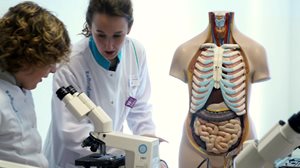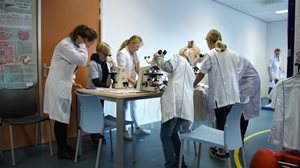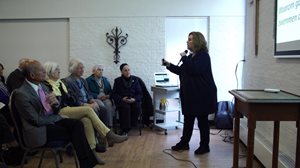RIMLS societal impact highlights of 2019
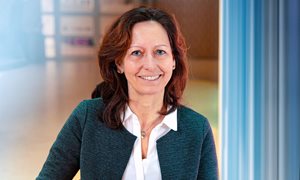
The search to improve the conditions of CAH patients
Every day, Hedi Claahsen and her colleagues deal with unsolved clinical problems. With her research, she tries to advance medical care, improve the patients' quality of life, and prevent long-term complications. read the interviewThe search to improve the conditions of CAH patients
I’ll do research as long as there are unanswered questionsClinician and pediatric endocrinologist Hedi Claahsen has had an eventful year. Besides her ongoing research and clinical work, one of her papers published in a high-impact journal* won the Dietrich-Knorr Prize for the best-2019 paper in the field of adrenal research. With the opening of the Radboud center of expertise Sex & Gender and the hosting of the first international CAH symposium, it doesn’t seem like things are going to calm down any time soon.
You’re considered one of the leading experts in the field of Congenital Adrenal Hyperplasia. Can you briefly explain this condition and your research?
“Congenital Adrenal Hyperplasia – CAH – is a group of inherited disorders affecting the adrenal glands. The adrenal glands produce corticosteroids and sex hormones (androgens). CAH patients don’t produce enough corticosteroids, which play a role in blood sugar levels, blood pressure, and the immune system. Due to a lack of the cortisol driven negative feedback system, the adrenal glands are continuously stimulated, becoming bigger (hyperplastic) and produce high amounts of adrenal sex hormones. In female CAH patients, the elevated androgens lead to prenatal virilization of the external genitalia. With medication like hydrocortisone, the missing corticosteroids can be replaced, and androgen production will be suppressed."
“One of my research themes is long-term complications in CAH patients. Male CAH patients have a high risk for infertility due to the presence of benign tumors growing in the testes. These tumors are known as testicular adrenal rest tumors, also known as TARTs. We discovered that these tumors seem to have features of the adrenal gland tissue. Our current study also shows testicular features. We, therefore, hypothesize that TARTs consist of more totipotent cells, such as embryological tissue. Now, our research focuses on the cause of tumor growth. This knowledge will hopefully help to develop medication to treat or prevent TART and, consequently, improve fertility."
“Another research line is carried out in close collaboration with Dr. Agustini Utari from Diponegoro University in Semarang, Indonesia. In Indonesia, medication, such as hydrocortisone, is not readily available. We know that untreated patients with adrenal diseases and cortisol deficiency have a high mortality rate. However, we observed that some CAH patients with severe cortisol deficiency still survive without medication. How is this possible, we wondered? We were able to show that these patients do have deficient cortisol production but strongly elevated precursor hormones that typically accumulate in CAH patients. Our in vitro studies showed that these precursors have similar cortisol activity on the glucocorticoid receptor and may probably partly compensate for the lack of cortisol. We still collaborate with Indonesia and hope to learn more about the natural course of this disease, and to improve medical care for these patients.”
You combine clinical work with research. Was it always your ambition to do both?
“I started my career as a children’s nurse at a local hospital in Germany. But I soon realized that I wanted to learn more, so I began studying medicine in Nijmegen. After completing my medical degree, I started my training as a pediatrician and pediatric endocrinologist and began my clinical PhD research on TARTs."
“Every day, my colleagues and I deal with unsolved clinical problems. With my research, I try to advance medical care, improve my patients' quality of life, and prevent long-term complications. As long as there are unanswered questions, there’s a reason to continue our research."
You have two exciting events coming up: the opening of the center of expertise Sex & Gender and an international symposium. Can you tell us a little about them?
“I’ve been the coordinator of the Radboud DSD center – Disorders/differences of Sex Development – for several years now. There’s a considerable waiting list for transgender patients. Our center has a highly dedicated DSD team, which consists of, for example, specialized nurses, endocrinologists, psychologists, and urologists. We realized they all have the necessary knowledge needed to offer transgender care. So, we decided to expand the center to Sex & Gender. I want the center not only to be a clinic where we help patients individually but also where we can pursue interesting new research themes as many transgender-related questions are still unsolved."
“Officially, the Radboud expertise center Sex & Gender will open in March 2020. With a skilled multidisciplinary team, we’ll offer highly specialized care and guidance to people with gender dysphoria. But, of course, we’ll continue our current care for people with variations in sex development.
“In October 2020, Radboud University will host the first international CAH symposium. I'm very excited to chair this symposium. Experts from all over the world accepted our invitation to come to Nijmegen and to discuss their current research in the field of CAH."
“The involvement of patients is important in both my clinical work and my research. For the implementation of the center and the upcoming symposium, we asked for input from patient organizations. They give us their views on varying aspects of our clinical care and our research questions. We also ask them to give their views on our grant proposals. I think this collaboration is one of our strengths. In March, our team will organize the annual CAH-day for the fifteenth time. Our patients and families get the opportunity to meet and to learn about the latest news in CAH care and research. It's an event we enjoy; and we get a lot of positive feedback and suggestions."
You sound extremely busy. How do you do it all?
“My days are certainly full. But my enthusiasm drives me. I enjoy my work every day. And working with my team and within my networks is a great pleasure for me."
"Of course, nothing's self-evident; I manage a lot of tasks myself. For example, I sometimes work deep into the night, writing a grant proposal. I also take the initiative for new endeavors. I like approaching people, and I've found that I'll always meet professionals who want to discover what we can achieve for our patients together."
*Journal of Clinical Endocrinology & Metabolism

Patient first? in cell biological research
How can we increase patient trust participation in cell biological research and which ethical issues play a role in this? read morePatient first? in cell biological research
In the summer of 2018 Alessandra Cambi (cell biologist) and Gert Olthuis (medical ethicist) were invited to give a joint talk to honor Ms. Jopie Verhoeven who retired as a chair of the Patient Advisory Council of the Radboudumc. Their discussions led to an article in Trends in Cell Biology. Its abstract: “Cell biological research investigates mechanisms of health and disease, with patients as the initial motivation and ultimate target. While increasingly visible in clinical research, patient participation in cell biological research remains limited. Here we discuss key ethical issues inherent in this development and the value of building trust and trustworthiness.”Olthuis G, Cambi A. Patient Trust and Participation. Trends Cell Biol. 29, 765-767, 2019.

ENABLE where science and society meets
From students, the general public to the elderly, they were all given a unique glimpse into the world of researcher. read more
Science challenge at high school
For four days, high school students took on the science challenge! Vaccinology, immunology and programming, everything was covered. The course was developed and implemented by our researchers. read moreScience challenge at high school
International PhD candidates Joshua Gillard, Dorien Feyaerts and Yessica Alina Rodriguez Rosales (themes Infectious diseases and global health and Inflammatory diseases), developed and implemented an exciting 4-day science challenge to teach vaccinology, immunology, and programming at the Lorenz Lyceum high school in Arnhem.
Focus on personalized healthcare at summerschool
Researchers from CMBI, TML and Human Genetics worked together for the summerschool on the theme of "Integrative X-omics analyses empowering personalized healthcare". read moreFocus on personalized healthcare at summerschool
Researchers from Center for Molecular and Biomolecular Informatics (CMBI), Translational Metabolic Laboratory (TML) and Human Genetics organized a successful summerschool on “Integrative X-omics analyses empowering personalized healthcare”.The course coordinators Alain van Gool and Peter-Bram ‘t Hoen look back at an exciting week, in which 20 participants from all over Europe convened for a week full of lectures, practicals, and labtours. The week started with an introduction into biomarkers for personalized healthcare by Alain van Gool (Mitochondrial diseases). Marcel Nelen introduced them into novel genomics technologies, and Hans Wessels and Jolein Gloerich (Mitochondrial diseases) did the same for novel proteomics technologies. Peter-Bram ‘t Hoen presented a range of X-omics data integration strategies. Other topics like metabolomics, methylation and network-based data integration were covered by external speakers from the Netherlands X-omics Initiative.
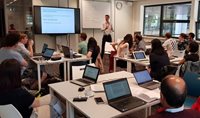
Throughout the week, the participants worked on an assignment for which they needed to design a X-omics study, and define a data analysis and management plan. The participants worked in multidisciplinary teams of four. Their different scientific backgrounds helped to address this assignment from different angles. On Friday, the participants presented their exciting studies covering a range of different topics: from the study of the influence of microbiome on constipation in Parkinson's disease, to the identification of early marker signals for infection in rheumatoid arthritis patients after treatment with tocublizimab, risk assessment in prostate cancer based on combined imaging and -omics profiling, the molecular mechanisms of non-alcoholic fatty liver disease, and the early detection of cerebral course of disease in X-linked adrenoleukodystrophy.
The organizers are looking forward to the next edition coming year.
